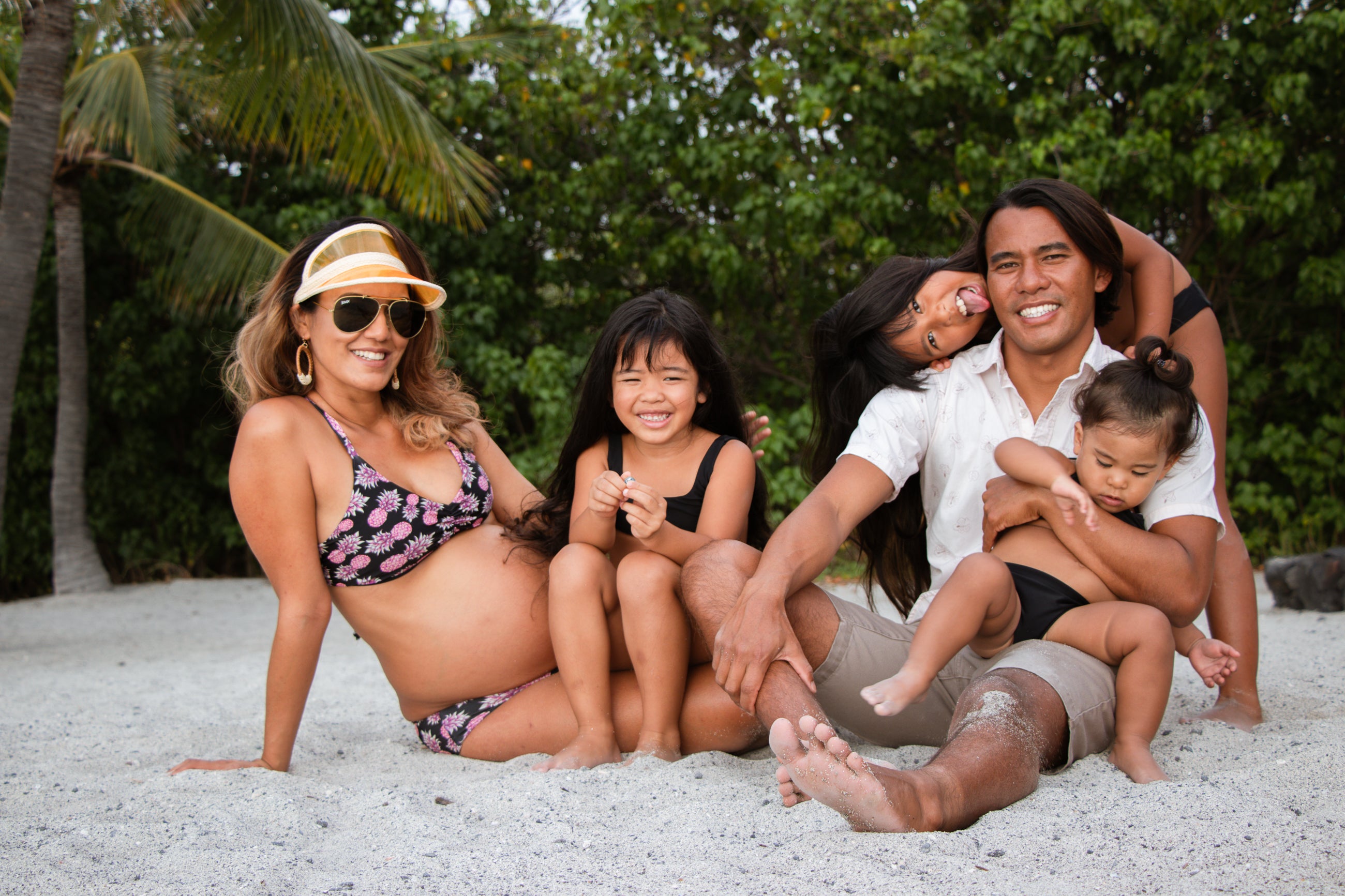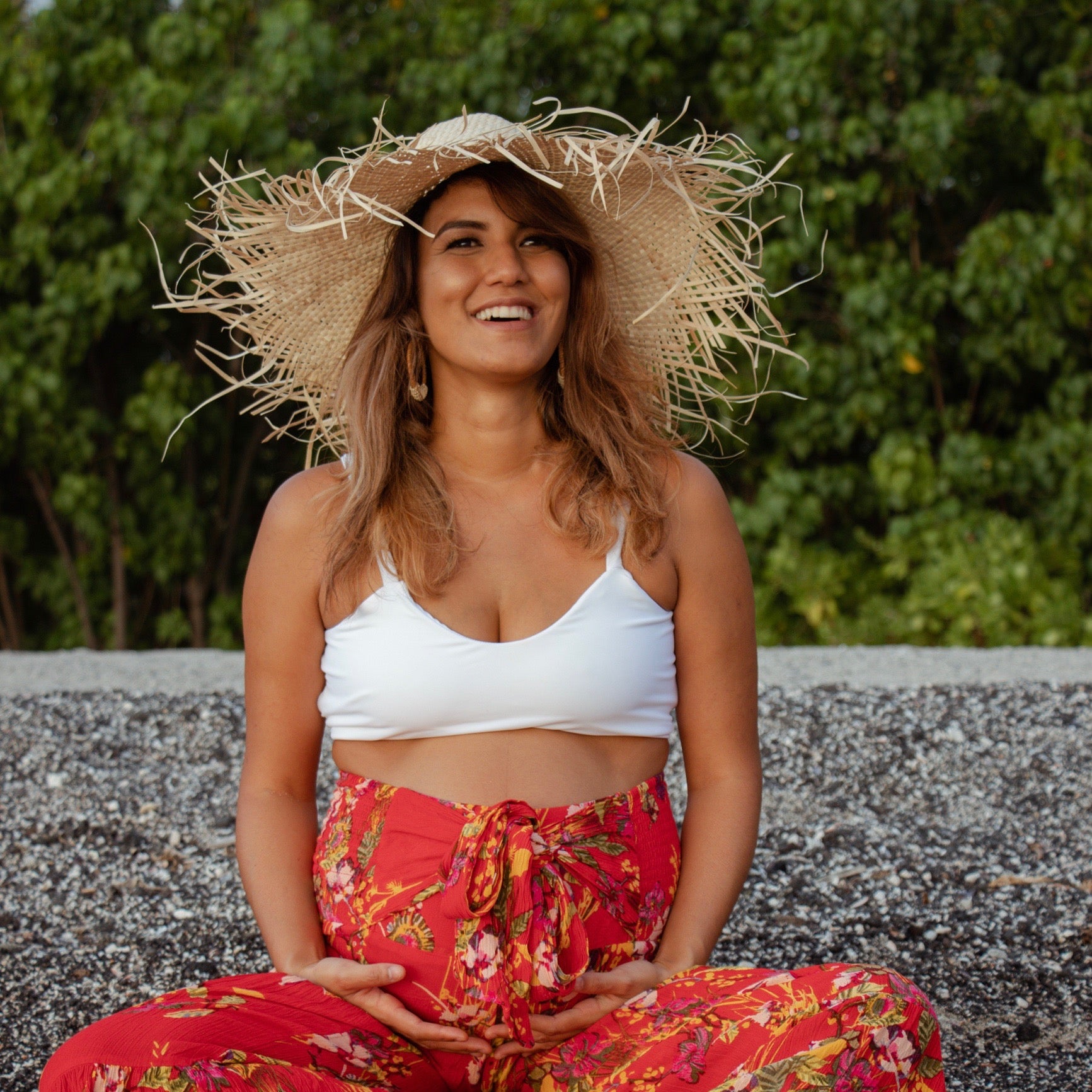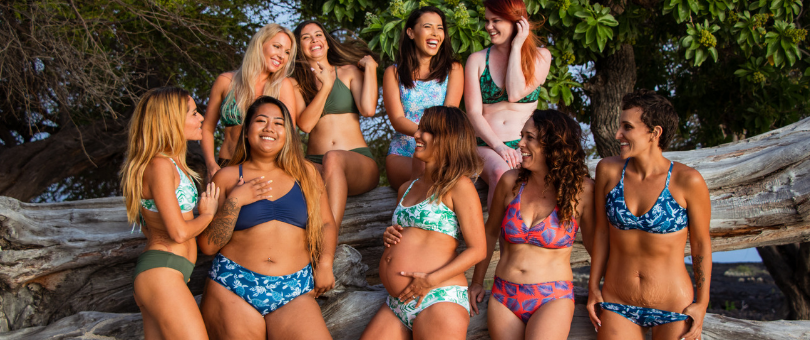Roxelle Cho was an active expecting mom who surfed during her pregnancy. As her body was changing, she was inspired to make her own swimwear that had a better fit. From making pieces on a second-hand sewing machine, Roxelle launched Fused Hawaii and built the swimwear brand into a seven-figure business. In this episode of Shopify Masters, Roxelle Cho shares her personal journey of overcoming hurdles, finetuning Facebook ads, and creating a sense of community for her customers.
Show Notes
- Store: Fused Hawaii
- Social Profiles: Facebook, Twitter, Instagram
How motherhood inspired her to launch a business
Felix: What was the inspiration behind Fused Hawaii?
Roxelle: I'm now a mom of four girls and so my first child. My body went through changes. I was surfing at the time when I was expecting, I have an active beach lifestyle here in Hawaii and basically I needed a suit that I felt comfortable in, that I could continue my lifestyle in but feel beautiful and confident in my skin. I started by purchasing a sewing machine from a garage sale. It was $30 and basically started my company on a broken sewing machine.
Felix: What were your first products?
Roxelle: My first product is still our best selling bikini bottom today. It's called the Kona bottom named after my hometown, super simple. I basically took five different bottoms that I loved and I took them apart and came home and I cut fabric, sewed fabric together, and I would literally put them on my body to size, take it to the beach and test it out. That's how we came up with the first product, and I started getting interest from my friends that were at the beach with me.

Felix: What about that first sale to a stranger, where did that come from?
Roxelle: I hit the streets, literally. I remember packing a backpack full of bikinis. We have these canoe races here in Hawaii annually, and they're international races so people from all over the world come to race their canoes at this regatta. These are ocean people, it's my avatar customer in a way, and I went down there and basically sold things out of my backpack. That's when I realized people who are ocean goers, who are active in the water, the person I was as well, they loved this suit. From there I started doing local craft fairs and markets, of course, surrounded by ocean water type people and we were selling out. But of course, at the time I was sewing each and every piece by hand, and so selling out meant 20 units, 40 units, 60 units. It was whatever I was hand-making at the time.
Felix: Did you ever have any intentions of "getting a real job" or day job or you had faith in this from the beginning?
Roxelle: I've never had a payroll type job. There were no other options. I've only started things, seen failed attempts quite a few times in businesses. When I look back at that time and where I am now it's dumbfounding, it blows my mind, but at the same time, it was this path that I needed to be on to be here now. It was all part of this greater plan for me. I think of those marketplaces or those craft fairs where some days it'd be raining or windy. I'd be under a tent that was blowing around and some days I'd feel like a complete loser. That's when I realized you don't ride the highs or the lows. If you can stay steady and consistent and stay on this constant path you're going to get somewhere.
The emotional journey that comes with entrepreneurship
Felix: How do you make sure that you aren't being too either super excited about the highs or super bummed out about the lows?
Roxelle: As long as I could fund my fun I would continue doing this. Looking back it was that simple. As long as I was having fun that's when things would be successful, that's when I'd be in flow, that's when I'd be creative, that's when I was happy from the inside, and everything you make is out of that core. Along the road, as entrepreneurs, we believe, we read things, and we start becoming people we think we should be in this process and that's when I found I was unhappy. It wasn't fun, you'll hear that a lot from my mouth, it's who I am. What I know I need is fun, in order to be creative. It's that simple. Always play.

Felix: When you made that realization that you were going to optimize for fun, what were some things that you cut out and what were some things that you actively pursued?
Roxelle: Initially it was the people I surrounded myself with, whether it be friends, business associates. At that time I'm growing my mindset so I needed to be surrounded by people who could create a positive atmosphere. At times they say entrepreneurship is a lonely journey, it really is, and so when you're cutting out friendships or acquaintances and relationships you're feeling like, "Oh my gosh, I'm going to be more lonely." I would substitute a lot of that with books and podcasts and fill my mind with positive content. What happens is as you clear that space new friendships come in. You make room for these new positive relationships to come into your life. Other things that probably have to clear out, it's basically for me it was my mindset, my thought process. A lot of the times I would be creating these stories that would leave me powerless without a choice to decide what kind of outcome our success I wanted to see. Learning to change the story, my narrative for my life that was step one.
Felix: Nowadays what do you stress about?
Roxelle: My biggest stress factor will always... My number one is money. It's always for me I'm growing out of it a little. It's constantly getting better, but as a female entrepreneur, as a minority woman in business as well, I was raised with a lot of money blocks and so that's been my biggest challenge in growing a seven-figure business is overcoming that. Those are all narratives, they're stories. They only have control over me if I give it that power, and so some days I fall back into that narrative and I give it that power. It's realizing when I'm doing that and then again we can choose otherwise.
A little bit of background is I grew up in Section 8 housing, on welfare. I know the world of addiction and abuse and all of the things that life is made up of. Then coming out of that, as a child I learned that those things were your story, that's what you were supposed to be, that's your narrative, and you continue down that path. Then I realized as I'm growing this business that I can change that. What happens initially if we continue living those stories, is as I hit a million dollars in revenue, I actually started self-sabotaging my business. Every time I'm almost near a goal, say the seven-figure goal, I did it so many times where I actually self-sabotage. I dismantled my team, I broke, I would actually lose money. I didn't know it was intentional, in a way, to get me back into this comfort zone.I knew the feeling of struggle and I could be there forever because it was comfortable. Struggling would always be my story as a business owner if I continued telling that story. The moment I decided to get into discomfort a little bit, taste what success felt like a little bit, and become the person you actually need to be to run a seven-figure and eight-figure business, that's scary.
Felix: When you recognize this that you get to be more comfortable in success, what actions do you have to take to live that way?
Roxelle: Stop sabotaging your happiness. It's not as noticeable either. It's so comfortable to complain about all the things we don't have. It's so comfortable to be in that negative state of mind and say all things are hard. It's easy to do that, but it's actually really difficult to own your accomplishments, to own your success. That's my number one goal. Business isn't always fun, but what's fun for me is to see my community being able to see me as a female entrepreneur rising and standing in these really big shoes and believing in myself. Standing there a little longer because as you do start believing in yourself you get judged along the way and you feel judged. That judgment sometimes makes you want to play small and keep quiet. That way you don't get as much attention on you, and a lot of attention also means negative attention. Yeah, feeling the feelings. A lot of times feeling joy and happiness. I wasn't taught that when I was a kid. That was not my normal, so for me feeling the good feelings is actually something I'm getting used to.
Felix: What would you say to entrepreneurs out there that feel this impatience for success?
Roxelle: I would say on those days what I would tell myself as well is what is the one step we can take today? Many times it doesn't cost a thing, maybe it's a phone call, maybe it's writing something, maybe it's recording some content. Whatever it is what is the possible thing that we could do today that could move us and nudge us forward towards that big goal?
Staying calm and testing the waters with Facebook ads
Felix: Where were you getting your initial customers online?
Roxelle: First I had a retail location and we were losing money, about $10,000 to $15,000 a month. I had a year left on my lease and rent in Hawaii is expensive. I'm like, "Okay, I can't sustain this. We're going to go bankrupt." That had been my story as well. Growing up I’ve seen bankruptcy. I decided what else am I going to do? My husband had told me “Why don't you try Facebook ads? Why don't you try your Shopify store and figure out Facebook ads, I hear it's a thing.” We knew nothing about it. I had a credit card left with about $20,000 open on it and I went onto Facebook and I threw spaghetti at the wall and seen what would stick. I figured it out enough. It was building out an image in Canva with a flat lay bikini on a white backdrop with an offer. I had no idea what I was doing. I was writing copy myself, I was building these ads in the business manager by myself. It was crazy when I look back. I learned enough to pay down my credit card daily, and so it was working enough for me to learn and I was paying for my education at the time. Was it super profitable off the start? No, and that's where I think a lot of people when they get into Facebook ads they lose a ton of money and then they quit, but I kept learning, I kept implementing the new lessons I was learning and getting better. Six months later I was pretty darn good at Facebook ads.

Felix: How do you remain calm in this space and not freak out and implode the entire thing and try to find something "safer", a safer way to earn a living?
Roxelle: I think that was my strength. When you're used to coming from nothing, from the bottom up and rising you don't have as many fears of losing. I didn't attach to the results to define my success. It wasn't a monetary gain a lot of time that I would gauge my success by, it was who I was in this process. Yeah, losing money I never correlated that to my success, and so I guess coming from nothing and having nothing as a kid growing up was my strength. I don't have the fear of losing everything and having to live in a tent at the end of the day like I did that before. It's not really scary.
Felix: What do you tell new entrepreneurs so that they are not so fearful to take risks or trust themselves more to take on big decisions?
Roxelle: I think even as I'm here now and I'm not at this bottom bracket, wherever that is, I have to constantly remind myself because if I don't remind myself of this I'll start believing all the hype around me, the society we live in and all the things that teach us about what's important. If I could tell them one thing I would say that there is beauty at the bottom. There's a beauty there that you'll never be able to grasp if you haven't. Been there before and that's why the most successful people, every single person you know that inspires you has a story to tell that inspires you because they've been to that dark place. It's in that darkness that you're able to find your light.
Felix: For anyone else out there that also wants to learn Facebook ads, what do you recommend these days?
Roxelle: For me, if I could go back in time I would strongly suggest building a community. If you don't have business debt and you're looking to start one, I have to go into Facebook ads right off the bat because I had bills to pay. If you don't have that and you're looking to be an entrepreneur one day and start your own business build a community, build an audience. Have fun, post pictures and content that you love because that joy is going to build a bigger community that's loyal to you and your mission. When you're ready to start a business that's all in place. You're not having to rely on advertising or a platform. Your community, if you value them they'll value you and the value always is in reciprocity.
Building a community of positivity
Felix: What made you make that decision to start also building a Facebook group even though you were already doing well with paid traffic?
Roxelle: I was getting bored with the game. I felt a little bit unattached to my community. As you get into these bigger numbers you start losing focus. You start looking at projections and things that make a business. I started this Facebook group on a whim and I called it EmpoweredbyFusedHawaii, all one word. I didn't even make it really easily searchable, and I put it out there to engage with my customers, one on one. I built under my personal name as well, it wasn't attached to my company name. I wanted to, as the founder, to talk to my customers like I used to do at the marketplaces. One on one and get to know who was this bikini buying woman on the other side of the screen. Who was she, what was her story, and how am I helping her, and what else can I do? That's it.
Felix: What did you do to start growing the Facebook group?
Roxelle: Initially it was inviting my audience, my email list, my customers, and they would invite their friends. Then now we started to run ads promoting the group. Yeah, using all platforms now to point. Come and join our community because that's where a lot of the value is. It's in these real people getting together. It's not me having to tell them or to market to them. They're talking about their own authentic experiences with bikinis, their bodies, their joys, they're encouraging one another. I'm hands-off. When I go into the group it's like, "How can we have fun? How can we have more fun?"

Felix: Can you tell us more about promotional ads within your Facebook groups?
Roxelle: Some of them will be videos or stories that have come from group members. Also, we do giveaway promotions that if they join our group or if they join the giveaway we redirect them to the group. It's a big investment. I've spent thousands and thousands of dollars to curate a community. It's a loss off the front end, there's no way that I could say if this isn't my bigger mission in life that this is a good idea, but I would definitely not say to invest the money I did to do this unless it's something you're truly passionate about. Because the money I've invested in this process it doesn't come back right off the bat. A lot of times I give away things, I'll run low end offers, almost giving away products to build this community that I believe in only because in Hawaii we call it the aloha spirit and it's giving and giving without any expectation of receiving anything in return.
Felix: Can you generate sales from Facebook groups?
Roxelle: Yeah, some days we'll have live parties in the group where we'll do live reveals within the group and I'll sell there. Sometimes we actually don't have the inventory to supply enough for my group. You'll see when you get there we give them limited early bird offers, we'll give them limited prints that they're not able to get on the site unless they have a certain link. We started the group last year and we're just going to be at 40,000 members.
Felix: When you were growing this group were you the only one there creating content? Did you have moderators, people helping out from the team, helping get the conversation going?
Roxelle: Initially it was me and I would go live and have these casual conversations like we're having here. Of course, when we grew to about 8,000 or 10,000 I have a moderator in place. We also have a team of support agents on the back end to curate customer concerns or questions. As we grow it becomes a whole business in itself to run the group. It's this learning process now of how do you create this really fun authentic atmosphere, but at the same time as people are coming in, on Facebook there are trolls, there are bots, there's a lot of profiles that we need to go through to provide a safe space for these women to come and share their stories and be vulnerable. We have rules and negativity isn't allowed. Anything that I wouldn't allow in my regular everyday life, comments towards myself get deleted. If it's not adding to a positive atmosphere we remove members, we block them, we delete them. Trying to create a very safe space, and with that comes feedback towards that as well. It's a different experience right now working with a community. It's not just a business, it's real people and it's real emotions. I believe the most human brands win.
Felix: Are these spontaneous Facebook lives or is there any promotion or planning involved in doing a Livestream that has the intention of generating sales?
Roxelle: Of course we're a business, we do want to generate sales. If I strip down to my behind the scenes process of our last party of 25,000 members, for me to do my job I have to be stress-free. I have to be present with the camera, with my community. I have the habits built in me to stress out, to procrastinate and wait until the last minute and then try and get everything done perfectly and built out. A lot of times it's me building out the site on the back end and I'm not a web designer or anything. If you look at my website I built it, it's not great. To set up this party the night before, I caught myself going into this loop of perfection thoughts and trying to create this perfect experience. Then those are the times where if I can stop to observe those thoughts I realize what was important was to have a fun experience. I made it super simple. I got 25 items that we were going to promote the next day for the 25k party, put them in a plastic tub and numbered them one through 25. Built out 25 surprise items on our site, on a landing page, and that's where I directed them to. On the party day, I said, "This is item number one revealed." As much as I would love to say I had a lot of time and curation, most of my time goes into my energy and creating this person that has to hold this space for this community.
Managing your mindset to manage your business
Felix: Do you think the entrepreneurs in general, the ones that you know or see and hear about, typically overthink this entire process?
Roxelle: There are both sides of an entrepreneur. There's the entrepreneur that jumps out of the plane and figures out the parachute on the way down. Then there are parts of ourselves that yeah, we get caught up in that perfection mindset. It's normal and that's the beauty of it all, we should be able to access all of these emotions, but not get stuck there. We should be able to access it because when we're not able to feel fear, feel the depths of every emotion that's also not healthy. To feel all the emotions, even self-doubt, I feel that as well but I don't get stuck there anymore.
Felix: What do you like to focus your attention on a daily basis?
Roxelle: My kids laughing, my husband and I enjoying life together. I mean I live in Hawaii so looking out my window and enjoying a sunset or the ocean or the wind or the trees. The things that really matter, because at the end of the day this business can fall overnight, the market is the market. I don't control that, so focusing on the things that are in my control, which would basically only be me and my thoughts and my emotions. Yeah, that's all I can control. Everything else is not in my control and so I am not going to divert any energy to feeding that thought.
Felix: Any advice that you have for other either aspiring or struggling entrepreneurs that are also parents?
Roxelle: That takes me back to the day where I'm eight months pregnant with my third or second, I was helping pack orders at the time and I remember the thought going through my head, "If you can do this imagine what you can do once you get through this." Everything that is happening to me is there to either teach me a lesson, to grow and to learn from it, and so I take life as it comes to me. I usually don't even know what day it is, what time it is because I'm trying to be present. If I were to think about the reality of my life. I have four kids and it is crazy every single day, and so if I were to be there in that thought process I don't think I would be able to get through the day. I have to be handling everything as it comes my way and that's all I really can handle. Let go a little, surrender a little to life and let it surprise you.
Felix: Can you give us an idea of the milestones hitting along the way and what was the scale of growth of the business as you progressed?
Roxelle: In 2016, towards the last two months I started jumping onto Facebook ads, so November, December. I think we did only $180,000 that year. Of course, the majority of it was in November and December. 2017 we jumped to about $500,000. 2018 is when we finally did seven figures and passed it, I believe it was at $1.3 million. 2019 just last year we closed at $2.5 million, and my projection for 2020, I actually wanted to sustain the numbers we had because scaling is hard capital wise and that's another thing to talk about for entrepreneurs is yes we can project right now that we can double again to $5 million, but of course it's if we have all of our ducks in a row. You purchase properly and don't dump too much money into advertising.

Felix: When you think about the challenges to break through to these different milestones along the way, what phase was the most difficult or required the most out of you?
Roxelle: Definitely the seven-figure number. In my head, there was some sort of block and I think literally I got stuck right before there to convince myself that I was possible, that I was capable of running a business past seven figures. For some reason, I created this roadblock in my head. Once I could see the other side of that and I could see myself being that person who was able to operate at that potential, then it was easy. It's the same. Right now I feel pretty comfortable with this scale, but I'm thinking the next jump is that eight-figure mark for some reason. I have to be prepared and that's when I realize every pitfall along the way is preparing you for that. Say the seven-figure brand that I now have, there was no way I would be able to sit here and have this conversation at this ease if I hadn't gone through all the things it took to be here.
Felix: What did you do to break through this roadblock, this false ceiling for yourself?
Roxelle: Look at what was the biggest thing that was scaring me. At every moment what was my biggest fear? Was my biggest fear maybe when I first started facing rejection of a customer not liking my product or my friends teasing me because I'm selling things at a craft fair and they had real jobs. Those were like what are my biggest fears and then staring them in the eye, feeling it, feeling what it felt like because it doesn't feel good being rejected. That's what it takes to be a seven-figure brand. I had to feel that. I still now what is my biggest fear, what am I really afraid of. Then sitting with that for a while, letting the feeling sink in, and normalizing it so it doesn't scare you as much.
Felix: Got it, so you mentioned you're redesigning the site. What is the intention of doing that? What are some of the goals that you want to achieve by this redesign?
Roxelle: The experience isn't there, the community isn't on the front page. I want them to be able to go to the home page and feel like I'm welcoming them into my home. Not a sales generating site, I want you to have a feeling and feel our community. Our Fused family in the process, introduce you to my story as well as the stories of others on the home page. Definitely more imagery, more Hawaii aspects. I'm from the Big Island of Hawaii, I want a volcano on the front page along with our beach. We're not just a bikini brand that... When people see beach it could be anywhere, it could be Florida, California. When they see a volcano and a beach only the Big Island. That's what I'm strong on my stance that I want there, and other things. Again, going back to the community parts of it, sharing stories, sharing transformations of other women. We also have a trade gallery that I want to feature on the home page where if you buy a suit we actually trade, and they buy and sell and trade within our community. They don't only buy from me anymore, they're buying from each other, which is not recommended as a business. A lot of the things are questionable that we do, but I know that that engagement builds community, and I know for the bigger picture that I'm after that's valuable.
Felix: What do you feel like needs to happen this year for you to consider the year a success?
Roxelle: Allow myself to be supported by my team and everyone around me. A lot of the times as entrepreneurs we've tried to do everything ourselves and we carry all the weight on our shoulders. This is the first year where I'd like to surrender to this process and allow support to flow into my life.








